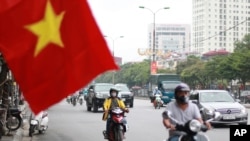A surge in fake news around Southeast Asia, particularly bogus COVID-19 information, has prompted leaders to explore a regional crackdown after a suggestion from a Vietnamese security official.
Police agencies in the 10 Association of Southeast Asian Nations (ASEAN) countries – which represent a total population of about 650 million from Myanmar to the Philippines – should improve cooperation to stop fake news among other cross-border crimes, a Vietnamese official said at a September 25 meeting with peers from around Southeast Asia.
“I think the issue is something that ASEAN has been keeping tabs on, but perhaps I think the impetus for Vietnam’s call recently is due to the COVID-19 situation and the consequent infodemic,” said Harris Zainul, an analyst at the Institute of Strategic and International Studies Malaysia.
“We know that there has been a spike in false information related to COVID-19 ever since the pandemic had started and arrived in Southeast Asia, so perhaps Vietnam’s call should be viewed in that context,” Zainul said.
The bloc member states signed a declaration in 2014 to encourage socially responsible media and four years later reached a consensus to minimize the harmful effects of fake news. Fake news is on the rise now, Nguyen Thanh Son, head of the Vietnamese Ministry of Public Security’s Foreign Relations Department, told the bloc’s Senior Officials Meeting on Transnational Crime.
Nguyen pointed to the COVID-19 pandemic as a reason for the spread of fake news as well as other crimes, according to Asian media reports.
In one case from an ASEAN member state, Philippine police arrested a woman in April after she said part of one province had 9,000 coronavirus cases when there were just over 6,200 infections nationwide.
“In the guise of being authentic news, fake news can directly become accessible to every Filipino by just a click on Facebook and which eventually makes Filipinos believe of its authenticity without looking at whether such news is from credible sources or not,” said Henelito Sevilla, international relations professor at University of the Philippines. “Fake news undermines the efforts of the Philippine government especially in times of the COVID-19 pandemic when It exposes wrong information.”
In another typical case for the ASEAN region, the Singapore government rebutted in April via its official website as “NOT TRUE” rumors that the country's supermarkets would restrict access based on customer identification card numbers. The website lists a string of fake news, followed by corrections.
Southeast Asian governments normally counter false medical tips with correct information or “increase literacy,” said James Gomez, regional director at the Bangkok-based think tank Asia Centre. But when governments come under fire, he said, they tend to strike back against the purveyors of news.
“Where they use these temporary laws or existing fake news laws is actually to go after their critics, especially criticism of how the different governments are handling the COVID-19 response,” Gomez said.
In democracies such as the Philippines, stepped-up enforcement of fake news risks flouting the constitution, said Herman Kraft, a political science professor at University of the Philippines at Diliman. Still, he said, the government of President Rodrigo Duterte will be tempted to use any new enforcement mechanism against critics.
“If it’s going to be an ASEAN thing, then that means taking action and labeling it as fake news against representations either in social media or in hate media that is actually associated with the left in particular in the Philippines,” Kraft said. “(This process) is something that I think the government might actually be interested in.”
Fake news is normally a domestic issue rather than a trans-border one, Zainul said. But if leaders of the Southeast Asian bloc follow up Vietnam’s idea, they might develop a list of uniform guidelines for all member countries to follow, he said. The parties could increase sharing of information from one country that affects another, as well.
Singapore, Thailand and Vietnam would be most eager of 10 member states, said Alan Chong, associate professor at the S. Rajaratnam School of International Studies in Singapore. Vietnam particularly has a lot riding on the accuracy of news, he said. Free speech is unprotected legally, but Vietnamese officials – mindful of economic development – seldom block websites.
“It’s part of Vietnam’s ongoing war against bloggers and social media because social media is considered extremely subversive and it subverts the image and authority of the Vietnamese Communist Party,” Chong said.




